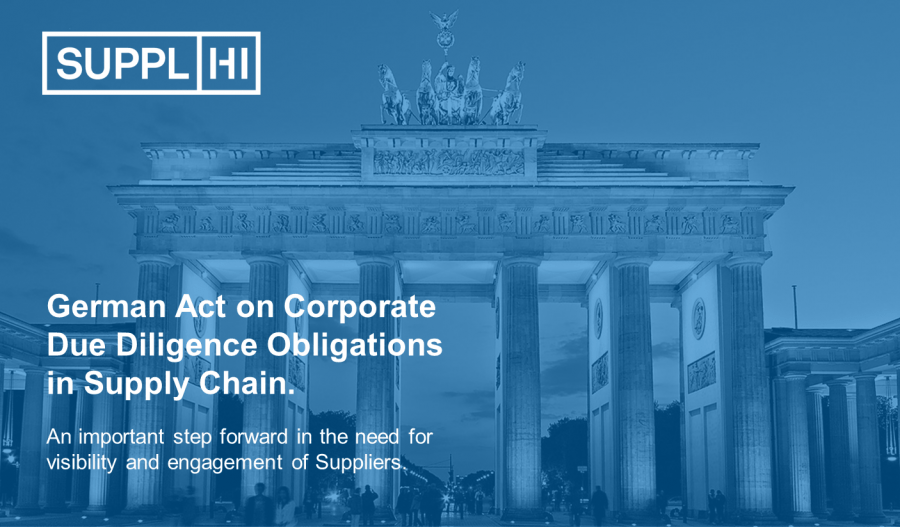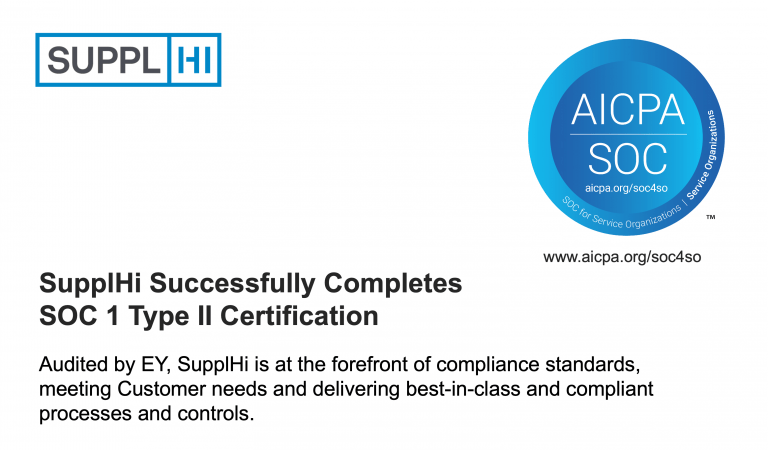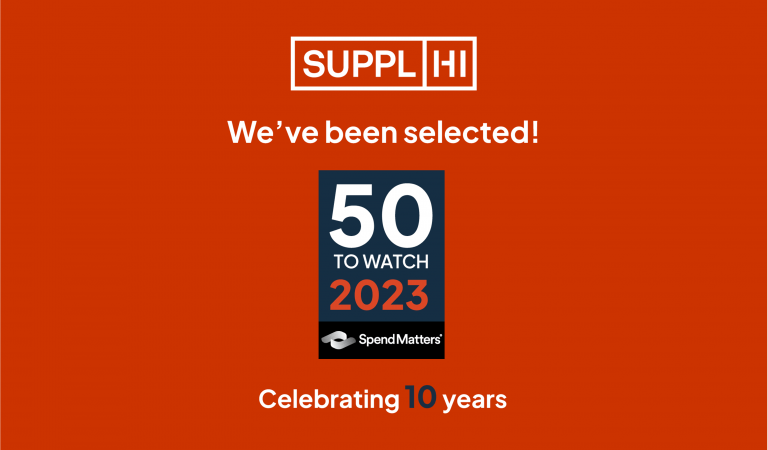The German Act on Corporate Due Diligence – also known as LkSG – is set to entered into force on January 1, 2023. During the summer 2021, the European Commission has announced a draft legislation on mandatory due diligence. France and the Netherlands already have legislations on due diligence in place.
In the next years, more legislations are expected to come into force following the German and European examples. Supply chains will need to be more visible and under constant scrutiny, at a global level. SupplHi’s digital solution is a pioneer in the field, driving efficiency and compliance in these important Sustainable Supply Chain processes, solving Buyer’s needs as well as stimulating improvement initiatives by Suppliers.
On July 16, 2021, the German Parliament passed the Act on Corporate Due Diligence Obligations in Supply Chain, providing regulations of due diligence obligations regarding internationally recognized human rights. This Act is an important step forward in the need for visibility and engagement of suppliers identified by SupplHi as one of the top 10 trends in the B2B Industrial Supply Chain. In fact, measurement of a company’s respect for human rights or environmental impact cannot be realized without taking into consideration the supply chain it relies on.
THE DUE DILIGENCE OBLIGATIONS
The Act on Corporate Due Diligence – also known as LkSG – is set to entered into force on January 1, 2023. It applies to the supply chains of all companies who have central administration, headquarters, statutory seat or domestic branch office in Germany with at least 3,000 employees (1,000 from Jan 1, 2024).
The Act states that an enterprise is responsible for the respect of human rights across all the steps necessary to the realization of its products or services, whether these processes happen in Germany or abroad. Moreover, the law clearly states that a company is deemed responsible for the actions in its own business area, those of its direct suppliers and also for those of its indirect suppliers – a statement that fully reflects the importance given to the supply chain and procurement cycle in both the ESG Sustainability and Carbon Emissions (Scope 3) estimates.
The due diligence obligations listed in the law include risk management and analysis, preventive measures and remedial actions, complaint procedures and reporting, forcing companies to take an all-round approach to safeguard human rights and prevent environmental damage. In more details:
– RISK MANAGEMENT – In the section on risk management, the German parliament requires enterprises to establish a risk management system with internal decision-makers in charge of monitoring all risks related, inter alia, to forced labor, child labor, discrimination, violation of freedom of association and environmental risk areas.
– RISK ANALYSIS – In addition to this, companies are under the obligation to perform a yearly analysis of the human rights and environmental risks of their direct suppliers, and, in case a risk is identified, the management must adopt a policy statement and a consequent strategy in order to prevent, minimize and remedy adverse impacts on human rights and the environment.
– REMEDIAL ACTIONS – The law also states that companies should either seek a solution together with the supplier or stimulate the industry to identify appropriate solutions. If no solution can be applied and risks cannot be nullified or reduced to an acceptable threshold, business relationship with the supplier may temporarily be suspended, yet this approach should only be used as a last resort.
– REPORTING – Furthermore, companies are required to submit a public annual report on the actual and potential negative impacts of their business activities on human rights and the environment: the report should be on company’s website for a minimum period of seven years.
The Federal Office for Economic Affairs and Export Control (Bundesamt für Wirtschaft und Ausfuhrkontrolle) monitors compliance with due diligence obligations and can conduct onsite inspections of companies. Should a company fail to comply with the due diligence requirements, the Supply Chain Act provides for sanctions in the form of financial penalty in administrative enforcement proceedings by the competent authority and confirms that any person claiming to have been violated in a legal position may authorize a domestic trade union or non-governmental organization to bring proceedings to enforce his or her rights. According to this, in the event of violations of the due diligence obligations under the LkSG, companies may find themselves exposed to both administrative offense proceedings and claims brought in the civil courts. Moreover, companies that were heavily fined may be excluded from public contracts for up to three years.
In conclusion, the law states that companies’ due diligence obligations can extend to the entire supply chain, and suitable control and risk mechanisms must be implemented as part of their compliance to the law when the LkSG comes into force on 1 January 2023. It is highly likely that mandatory due diligence will have high costs both for companies and for the state.
But what is more, to comply with the Supply Chain Act, companies will need to establish new governance process and structures that could impact on an enterprise’s analytical capacities.
THE EUROPEAN SITUATION
During the summer 2021, the European Commission has announced a draft legislation on mandatory due diligence based on a text proposed by the European Parliament earlier in the same year, which received an overwhelming support of 504 positive votes out of 705 seats and is deeply inspired by the United Nations Guiding Principles on Business and Human Rights as well as by the OECD Guidelines for Multinational Enterprises.
France and the Netherlands already have legislations on due diligence in place – the 2017 “Duty of Vigilance Act” and the 2019 “Child Labor Due Diligence Act” respectively – similar to the German Supply Chain Act.
In France, the Duty of Vigilance Act requires all large French companies – with over 5,000 employees in France or over 10,000 worldwide – to undertake due diligence for all the companies they control as well as for their contractors and suppliers. The Duty of Vigilance Act focuses on preventing risks and serious abuses of fundamental human rights and environment, through a “redress and liability” mechanism in case of non-compliance.
The Dutch legislation, instead, concentrates on combating child labor, and establishes that companies must investigate whether their goods or services have been produced using child labor and to develop a plan to prevent such a thing to happen in their supply chains. It imposes significant administrative fines, criminal sanctions for non-compliance and reporting. The act will become effective by mid-2022 and will apply to all companies that sell or supply goods or services to Dutch consumers, regardless of where the company is based or registered and without exemptions for legal form or size.
HOW TO COMPLY
All these legislations stress the concept that companies are no longer responsible just for themselves but must be considered together with their Supply Chains as if different and autonomous parts of a unique subject.
Risk monitoring, reporting and compliance are key implementations that companies must arrange and ensure over time. All these elements already exist in the SupplHi platform and can be found at the core basis of its structure.
Mapped as best of breed by Spend Matters in the 2021 Fall SolutionMap for Supplier Relationship Management, SupplHi is an industry shared all-around tool to efficiently manage a compliant vendor base through a single SaaS dedicated to B2B industrial supplies.
When using SupplHi, Buyer organizations can view and manage multiple types of Risk Assessment Scores, as well as configure algorithms to automatically calculate risk scores, set “acceptability thresholds” that automatically trigger warnings when risk levels are excessively high, share automatic recommendations on how to mitigate risks, access to dedicated reporting, dashboards and easily export data to any BI tool.
Moreover, one of the many advantages of an industry-shared platform is that vendors can maintain one single profile and register all information related to risk monitoring and compliance in a single place, as well as receiving automatic notifications in case information provided is expired or about to.
In the next years, more legislations are expected to come into force following the German and European examples. Supply chains will need to be more visible and under constant scrutiny, at a global level. SupplHi’s digital solution is a pioneer in the field, driving efficiency and compliance in these important Sustainable Supply Chain processes, solving Buyer’s needs as well as stimulating improvement initiatives by Suppliers.



